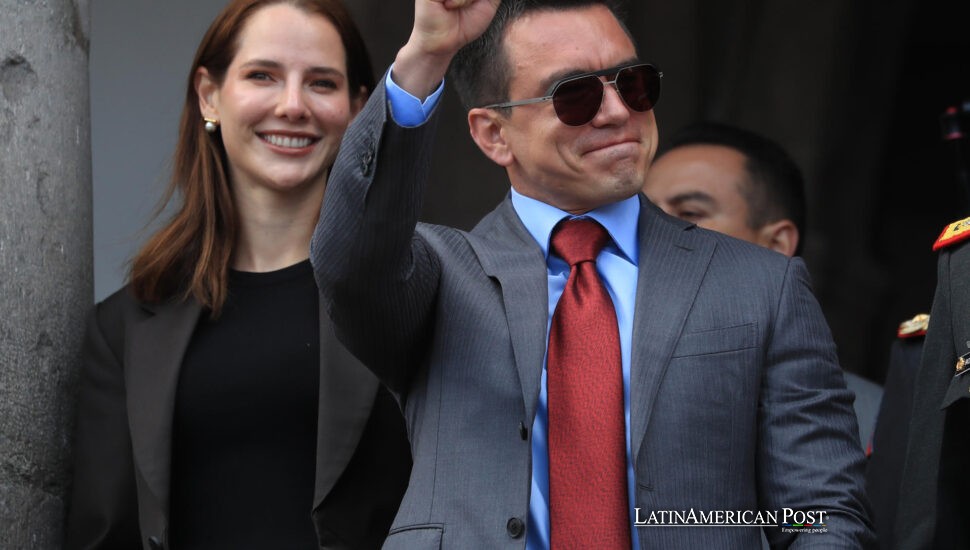Ecuador’s Noboa Achieves Electoral Victory as Leftists Call for Election Recount

Daniel Noboa declared a decisive reelection win against Luisa González, who ran as Rafael Correa’s political ally. Official election results demonstrate Noboa’s substantial lead, which sets him up for another four-year term despite González’s refusal to accept these results.
A Surprising Margin of Victory
The unexpected reelection of Daniel Noboa stands out as a decisive outcome in a political environment characterized by frequent dramatic changes. The incumbent received approximately 56% of all valid votes when 94% of ballots were counted, while Luisa González from the Citizens’ Revolution (RC) party took 44% of the vote under former President Rafael Correa’s leadership. That double-digit lead translates into more than a million votes separating the two, a margin the National Electoral Council (CNE) deemed “irreversible.”
The electoral momentum Noboa carried into this second round contrasts sharply with the tight results of the first vote. Only a few months ago, he had eked out a narrow advantage of roughly 16,000 votes over González. Given the close initial contest, the scope of his latest triumph caught many analysts off guard—particularly since pre-election polls had predicted a tight race.
Equally notable is Noboa’s track record in runoffs. Just two years earlier, in extraordinary elections called under unique circumstances, he had managed a similarly surprising victory over González. That earlier contest not only made him Ecuador’s youngest democratically elected president but also one of Latin America’s youngest leaders at the time. Noboa won two runoff elections in a row versus a common rival. This highlights his developing political resources. Such resources seem to connect with voters. These voters want stable plus progressive management.
From Promises to Power
Noboa’s success is rooted in part in a comprehensive campaign message that appealed to both business interests and moderate reformers. Coming from a prominent family—his father being a well-known banana magnate who ran repeatedly for the presidency—Noboa leveraged name recognition while positioning himself as a fresh alternative. The platform indicated plans to grow the economy, bring in investment from other nations along with change rules for workers. This happens as security worries increase, giving Ecuador a prominent, unfortunate position concerning killings in the area.
But Noboa is ready for a term running from 2025 to 2029. He intends to continue with the Constitutional Assembly. The proposal was a major component of his recent campaign. He has repeatedly argued for replacing the 2008 Constitution, enacted during Rafael Correa’s presidency, to better combat organized crime and expand economic reforms. He envisions a fundamental rethinking of the national charter, one that would reduce bureaucratic red tape, clarify the investment environment, and give the government additional tools to tackle gang violence and drug trafficking.
From his family’s beachfront residence in Olón Noboa expressed positive expectations for Ecuador during his victory speech. He expressed gratitude to his supporters for selecting a new direction while emphasizing the election results as a significant generation change. His public declaration conveyed Ecuador’s desire to advance toward the future rather than revisit prior years.
Disputed Results and Allegations of Fraud
Luisa González, however, refuses to concede. After Noboa’s reelection was declared official, González publicly accused Ecuador’s electoral authorities of executing what she deemed “the most grotesque fraud in Ecuador’s history” because no trustworthy polls or exit surveys indicated such a large margin between the candidates. She insists that her vote count changed very little between the first and second rounds—a phenomenon she believes is suspicious given the usual vote swings in runoffs.
Former President Rafael Correa lent weight to her allegations, posting on social media that the outcome was “impossible.” As a divisive political figure in Ecuador, Correa has repeatedly stated that the nation’s power structures stand united in opposition to his political movement. His political movement maintains a loyal following, yet his legal battles and voluntary exile to Europe prevent him from launching an immediate legal or political challenge in Ecuador.
The National Electoral Council continues to assert the election result is valid plus final. A voter participation rate of 84 % happened. The runoff election had tightly controlled safety measures. Noboa had declared an “internal armed conflict” early in 2024 in response to escalating violence—particularly drug-related crimes that have catapulted Ecuador into having one of the highest homicide rates in Latin America. Against that backdrop, police and military forces worked to keep the peace on election day, resulting in a largely orderly balloting process free of major incidents.
International monitors offered validation to the count. Representatives from the Organization of American States were among them. Luis Almagro, the OAS acting Secretary General, stated something to this effect. The mission’s independent observation, in his opinion, closely matched the official CNE data. While he acknowledged González’s right to request legal reviews, Almagro maintained that there was no immediate evidence to support claims of systemic fraud.
Balancing Security and Constitutional Overhaul
Noboa now faces a dual challenge: Noboa has to handle immediate security concerns alongside his goal of reshaping Ecuador’s constitutional system. A spike in criminal violence linked to drug trafficking organizations has overwhelmed local authorities and diminished public confidence in institutional systems. Members of the public demand immediate action alongside concrete outcomes to diminish gang presence in coastal areas and reduce homicide statistics.
On the other hand, the path to a new constitution is strewn with potential political roadblocks. Convening a Constitutional Assembly will require either legislative support or a popular referendum—neither of which is guaranteed. Noboa has a clear electoral mandate. The makeup of Ecuador’s National Assembly plus opposition from powerful political groups can create problems for his reform plans. Some think rewriting the constitution is a distraction from urgent economic and security problems. Noboa states that basic topics, like law enforcement’s legal foundation, investment guidelines, and job regulations, demand constitutional revisions for stability over time.
Under the circumstances, the victory that many did not expect only shows the beginning of a drawn-out effort to implement comprehensive changes. Noboa’s supporters welcome what they view as an invigorated political dynamic, free from the polarizing figures and policies of the past. Meanwhile, critics—particularly those aligned with Correa—fear that the new constitutional project might strip away certain social protections or reshape the balance of power in ways that marginalize dissenting voices.
Noboa’s swift ascent plus later win in the election stand as a turning point for Ecuador. He takes over a country that faces crime, an unstable economy along with significant disagreements in politics. He has newly granted authority, combined with common public wish for real change. Whether his administration can translate that mandate into meaningful policies may hinge on his ability to unify divergent constituencies around a coherent, forward-looking vision.
Also Read: Bridging Oceans: Conflict in Lebanon, Hope in Latin America
What emerges from Ecuador’s political crucible over the coming years could set the tone for the entire region. As criminal networks increasingly treat national borders as mere lines on a map, countries like Ecuador must redefine how they cooperate, legislate, and safeguard civil liberties. If Noboa’s promised constitutional overhaul succeeds, it may become an example—positive or cautionary—for other nations grappling with similar challenges. At the moment, attention is focused on the returning president. His surprising success in the election shifted the political situation in Ecuador again. A lot of people question if his large goals can survive the problems coming up.





